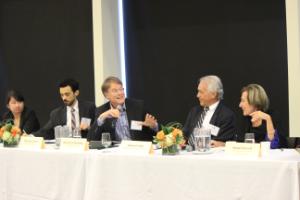Energy security – defined as the uninterrupted availability of energy sources at an affordable price – is one of today’s most pressing international issues.
The University of Miami (UM) College of Arts & Sciences is implementing innovative interdisciplinary approaches to this topic. For example, the College is pursuing “cluster hires” that will bring together faculty from five different disciplines (such as biology and environmental science) to examine energy security.
 |
|
Panelists discuss “Energy and the Global System” at last |
Through the College’s Department of International Studies, it has also launched an annual conference to address this issue. The 2014 symposium – which took place last week – focused on the role of emerging economies (particularly the BRICS countries: Brazil, Russia, India, China and South Africa) in energy security.
Professor of International Studies Bruce Bagley was a principal organizer of the event. In introductory remarks, he said the agenda for the day-long meeting touched on three main areas: “consumption and production patterns and strategies for maintaining energy security, the energy revolution in North America and how it will affect energy security, and patterns of energy production and economic growth in Latin America.”
Consul General of Canada in Miami Louise Léger discussed the unique energy relationship between the United States and Canada, which provides one-third of the oil, 90% of the natural gas, and one-quarter of the uranium imported to America. “Canada is a leader,” she said, adding, “We can meet the needs of tomorrow.”
College of Arts & Sciences Senior Associate Dean Douglas Fuller, an environmental scientist and professor in the Department of Geography and Regional Studies, talked about the transformation of global oil markets and the impact of this change on energy security. He asked: “What can we do to mitigate the effects of the energy we use?”
The symposium featured four panels: Energy and the Global System; Emerging Economies, Energy and the World Economy in the 21st Century: Changing Patterns of Production and Consumption; Energy Production, Technological Development and Environmental Sustainability in the 21st Century; and Hydrocarbons vs. Renewables in the Future of Global Energy Production.
An edited volume of the conference papers – which included both internationally focused presentations and country-specific studies of Russia, China, Ecuador, India, Brazil and Venezuela – will be produced in early 2015.
October 01, 2014

